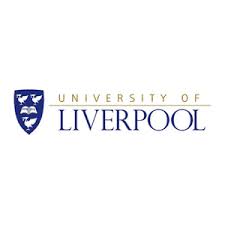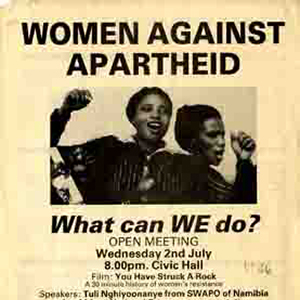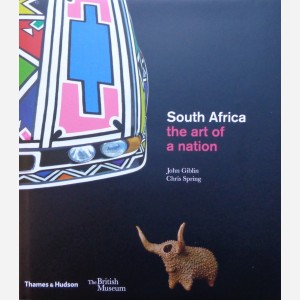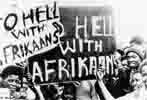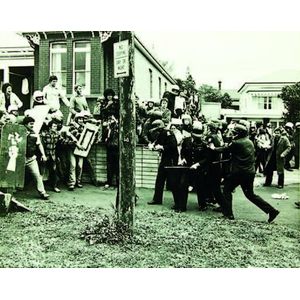London Recruits will tell the sensational story of the young women and men who undertook secret missions for the ANC in the bleakest years of the apartheid regime. The film will be out later this year.
In March 1970 Liverpool students occupied the university’s Senate House to press demands that included disinvestment from South Africa and the resignation of the University’s Chancellor, the Marquess of Salisbury.
Nine students, including Channel 4 news presenter Jon Snow, were suspended and one, Pete Cresswell, was expelled. Pete never did get the degree he had spent three years working for. Last December, 46 years later, Liverpool University gave him an honorary degree. In this video Jon Snow remembers the sit-in and pays tribute to Pete: https://twitter.com/livuninews/status/806863029388398592
Leeds Women Against Apartheid was formed in 1986 to bring together women in support of their sisters in South Africa and Namibia. The group reached out to women’s organisations in West Yorkshire, raising funds for women in Southern Africa, boycotting apartheid goods and holding day schools publicising the situation of women under apartheid.
It was linked to a women’s group in Soshunguve township, near Pretoria. These leaflets and posters are from the collection of LWAA publicity material held by the Feminist Archive North (FAN)
British Museum, 27 October–28 February 2017
This major exhibition tells South Africa’s history through its art, from the rock art made by the country’s earliest peoples to 20th century works combating apartheid and pieces that illustrate the post-apartheid transformation.
The exhibition includes badges and other rmaterial from the Anti-Apartheid Movement. http://www.britishmuseum.org/whats_on/exhibitions/south_africa.aspx
London Recruits will tell the sensational story of the young women and men who undertook secret missions for the ANC in the bleakest years of the apartheid regime.
This exciting film project is making a final push to reach its funding target. You can read about it here.
16 June 2016 is the 40th anniversary of the uprising by Soweto school students which marked the beginning of the end of apartheid. Thousands of young people defied police bullets and hundreds were killed and injured. Over the next year many were detained and tortured, and others went into exile.
In London former student activists, historians and journalists will discuss the legacy of Soweto at a symposium at the Institute of Education, Bedford Way, WC1 on 16 June, 5–8pm. ‘Remember Soweto’
Scotland’s role in the international anti-apartheid movement will be the focus of an extended version of the ‘Forward to Freedom’ exhibition at the Scottish Parliament, 1–5 February. Four Scottish local authorities gave Nelson Mandela the freedom of their cities and the Scottish AA Committee brought together trade union, church and student support for anti-apartheid campaigns.
The exhibition features Mandela’s visit to Glasgow in 1993 and Scotland’s role in the cultural boycott of apartheid South Africa. It will be at Midlothian Libraries, 8–26 February; Aberdeen City Libraries, 29 February–2 April; and Glasgow Caledonian University, 4–29 April.
‘London Recruits: the movie’ will tell how young Londoners undertook secret missions against South Africa’s apartheid regime in the early 1970s.
Some of them kept silent for over 40 years. Now Cardiff-based film-makers, Barefoot Rascals, are planning a feature film that will tell their story. The film will feature interviews, dramatised reconstructions and original documentary footage. The makers have already raised their crowd-funding target of £40,000. You can read about the project here.
‘Try Revolution’ tells the story of the Springbok rugby tour in 1981. The film has live footage of the anti-apartheid demonstrations that tried to stop the tour.
The protests rocked New Zealand and were beamed to South Africa, where white rugby fans watched in horror and the majority looked on with hope. In this one hour documentary South Africans from Archbishop Desmond Tutu through to ordinary rugby fans talk about how these events affected them personally and helped to end the apartheid system. You can watch a trailer for the film here
For nearly three years in the mid-1980s shopworkers at Dunnes Stores in Dublin went on strike rather than sell South African goods. Now Ardent Theatre Company are looking for a London venue for Strike!, a play about the protest that received rave reviews in Dublin. To support the project go to Ardent’s project page www.ardenttheatre.co.uk/strike
The strike began in July 1984 when Mary Manning refused to sell Outspan oranges to a customer and was suspended by management. Eleven colleagues followed her out on strike. They thought it would last a couple of weeks. The strike went on for nearly three years and became a cause célèbre. When Nelson Mandela met the strikers in 1990 he said news of the protest reached him in prison. Two of the strikers travelled all over Britain inspiring others to take up the boycott. Mary Manning was the keynote speaker at the AAM’s 1985 National Boycott Conference and strikers representatives met GLC Leader Ken Livingstone at County Hall in London.


